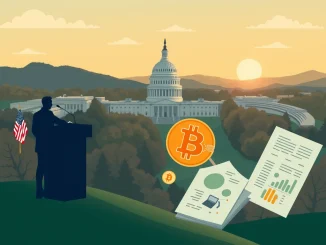
The world of cryptocurrency is constantly evolving, and so is the regulatory landscape attempting to keep pace. Recently, a significant challenge has been raised regarding the approach of the U.S. Securities and Exchange Commission (SEC) towards regulating this dynamic market. A prominent investor advocacy group, Better Markets, has voiced strong criticism of the SEC’s methods, particularly concerning **SEC crypto regulation**.
Why is SEC Transparency in Crypto Oversight Questioned?
At the heart of Better Markets’ concern is the SEC’s reliance on informal staff guidance rather than following the established process of formal notice-and-comment rulemaking. In a letter sent to the SEC on June 11, Better Markets highlighted that this informal approach lacks crucial elements necessary for effective and legitimate regulation. Specifically, they pointed out the absence of:
- Transparency: The public and the industry are left guessing about the agency’s stance.
- Public Input: Stakeholders don’t have a formal opportunity to provide feedback on proposed rules.
- Accountability: Decisions made through informal guidance can be less accountable than those made through a public rulemaking process.
This method of handling **crypto oversight**, according to Better Markets, weakens the legitimacy of the regulatory framework and undermines democratic oversight.
Better Markets SEC Confrontation: The Meme Coin Example
Better Markets didn’t just offer general criticism; they provided a specific example to illustrate their point. They cited the SEC’s February statement regarding meme coins. Despite the highly speculative and volatile nature of these digital assets, the SEC’s statement labeled them as mere “collectibles.”
Better Markets argues that classifying such assets, which are clearly traded for speculative investment purposes and exhibit significant market volatility, as simple collectibles is a flawed application of guidance. This example underscores their argument that informal statements can mischaracterize complex assets and regulatory challenges without the rigorous analysis and public scrutiny that **formal rulemaking** would require.
Understanding Formal Rulemaking vs. Informal Guidance
To appreciate Better Markets’ criticism, it’s helpful to understand the difference:
- Formal Rulemaking: This is the standard process for federal agencies to create regulations. It typically involves publishing a proposed rule, allowing a period for public comments (from individuals, companies, advocacy groups, etc.), reviewing those comments, and then publishing a final rule. This process is transparent, allows for broad input, and creates legally binding rules.
- Informal Guidance: This can take various forms, such as staff statements, speeches, or task force pronouncements. While intended to offer clarity, it doesn’t carry the same legal weight as a formal rule and bypasses the public comment process. Better Markets argues that using this for significant **SEC crypto regulation** effectively creates policy without public participation.
The Call for Formal Rulemaking and Restoring Trust
Better Markets’ letter concluded with a clear demand: the SEC should restore trust in its regulatory approach by returning to formal public rulemaking for cryptocurrency matters. They believe this is essential for developing clear, effective, and legitimate rules that protect investors and ensure market integrity in the crypto space.
The group emphasized that while the crypto market presents unique challenges, sidestepping established democratic processes is not the answer. Proper **crypto oversight** requires careful consideration, expert input, and public participation to build a robust and fair regulatory environment.
Why Does This Matter to the Crypto Community?
This criticism from Better Markets is significant because it comes from a respected investor advocacy group. Their push for **SEC transparency** and **formal rulemaking** aligns with calls from many in the crypto industry for regulatory clarity and a predictable legal framework. Ambiguous or informally communicated rules create uncertainty, potentially stifling innovation and making it harder for legitimate businesses to operate while failing to adequately protect consumers.
Conclusion: The Ongoing Debate Over SEC Crypto Regulation
The letter from Better Markets highlights the ongoing tension between the SEC’s efforts to regulate the crypto market and calls for a more transparent, participatory process. The debate over informal guidance versus **formal rulemaking** is crucial for the future of **SEC crypto regulation** and ultimately impacts how **crypto oversight** is conducted. As the crypto landscape matures, the methods used to regulate it will continue to be scrutinized, with groups like Better Markets pushing for processes that prioritize public input and accountability to ensure effective and legitimate **SEC transparency**.



